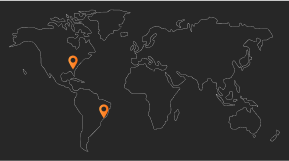The Silent Revolution of AI Agents: Invisible Uses with Real Impact

In recent years, advances in artificial intelligence have dominated headlines, driven by generative tools that promise to write emails, create images, and boost productivity almost magically. However, in the shadow of these popular applications, a new kind of transformation is quietly emerging, strategic and deeply structural.
These are the uses of intelligent agents that, although rarely discussed in mainstream circles, have the potential to redefine critical areas of society.
When experts, or even the most advanced generative AI models, are asked about an AI use case that isn’t at the center of current discussions but should be, the answers move away from entertainment and convenience.
They point instead to fields where artificial intelligence not only automates, but also reasons, interprets, and makes informed decisions in contexts of extreme complexity.
What this thought exercise reveals is a set of AI applications operating behind the scenes of city management, public policy, justice, environmental preservation, and organizational ethics. These are places where AI’s impact is less visible, but significantly more profound.
Evidence-Based Urban Planning
One of the most promising, and least discussed, use cases is AI-guided urban planning.
Instead of making decisions based on estimates or political agendas, intelligent agents can process massive amounts of data on mobility, housing, land use, and climate patterns to help urban planners design cities that are more resilient, efficient, and human-centric.
ChatGPT, for example, proposed the integration of multiple data layers to simulate the effects of urban decisions before implementation, anticipating traffic bottlenecks, heat islands, or even social segregation.
Industrial Cybersecurity: Predict, Don’t Just React
In physical environments, factories, power plants, critical infrastructure, AI can do more than just detect anomalies.
According to Claude 3.7, AI agents with continuous reasoning capabilities can predict structural failures and operational risks before they occur.
In sectors where seconds of delay can cost lives or millions in damages, anticipation becomes a vital safety tool. Here, AI is no longer just an interface, it becomes a foundation.
Cultural Translation at Scale for Public Policy
Gemini 2.5 brought a rare perspective: AI as a mediator between the cold language of government policy and the complexity of local cultures.
In countries with continental dimensions or vast socioeconomic diversity, well-intentioned policies often fail in practice due to lack of contextualization.
Culturally and regionally aware AI agents can adapt public strategies to resonate with those living in each reality. It’s not just about translating languages, it’s about translating intentions.
Environmental Monitoring and Biodiversity Conservation
While satellites and sensors collect real-time environmental data, few systems are able to turn this data into effective action.
DeepSeek shared a remarkable case: AI listening to the forest, literally.
Specialized agents analyze sounds, images, and behavioral patterns of fauna to identify illegal activities and predict ecological collapse. It’s a silent but vital revolution in the preservation of endangered ecosystems.
Diagnosing Institutional Bias
Qwen 2.5 pointed to the heart of social structures: systemic bias.
Imagine an AI trained to analyze court decisions, internal documents, and corporate policies, identifying invisible patterns of exclusion, discrimination, or favoritism.
It’s not about automating compliance, but offering a critical lens into institutional operations. Complex, sensitive, and urgent, especially in times of polarization and institutional distrust.
Ethical Counsel for Product Development
Grok offered a bold proposition: AI as an ethical advisor.
Instead of developing products and then assessing the damage caused, intelligent agents could step in from the beginning, asking difficult questions, simulating impact scenarios, and helping teams make more responsible decisions.
In a world where consumer trust is increasingly fragile, thinking of ethics as a competitive advantage is not just a trend, it’s a necessity.
Precision Agriculture by Microclimate
Finally, Perplexity shared one of the most pragmatic applications: AI for hyperlocal agriculture.
Instead of relying on broad weather forecasts, intelligent agents analyze specific microclimate conditions to guide decisions on planting, irrigation, and harvesting.
The return on investment (ROI) is exceptionally high, especially in regions already affected by climate change.
Conclusion: The Impact Is Behind the Scenes
These examples share one thing in common: none of them were designed to go viral on social media. They don’t lend themselves to quick tutorials or promise instant productivity. On the contrary, they are complex, systemic, and long-term.
And perhaps that’s why they remain off most people’s radar.
But it’s precisely in these backstage roles, where AI operates with discretion, responsibility, and contextual intelligence, that its true transformative potential lies.
As our relationship with technology matures, it’s imperative to widen our focus. The AI that matters isn’t the one that dazzles in the short term, it’s the one that sustains civilizations over time.
It’s no longer enough to ask, “What can AI do for me?” We need to start asking: “What can AI do for all of us, even when no one is watching?”
